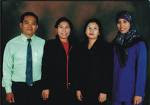Anger can be of one of two main types: Passive anger and Aggressive anger. These two types of anger have some characteristic symptoms.
1. Passive anger
Passive anger can be expressed in the following ways:
Secretive behavior, such as stockpiling resentments that are expressed behind people's backs, giving the silent treatment or under the breath mutterings, avoiding eye contact, putting people down, gossiping, anonymous complaints, poison pen letters, stealing, and conning.
Psychological manipulation, such as provoking people to aggression and then patronizing them, provoking aggression but staying on the sidelines, emotional blackmail, false tearfulness, feigning illness, sabotaging relationships, using sexual provocation, using a third party to convey negative feelings, withholding money or resources.
Self-blame, such as apologizing too often, being overly critical, inviting criticism.
Self-sacrifice, such as being overly helpful, making do with second best, quietly making long suffering signs but refusing help, or lapping up gratefulness.
Ineffectualness, such as setting yourself and others up for failure, choosing unreliable people to depend on, being accident prone, underachieving, sexual impotence, expressing frustration at insignificant things but ignoring serious ones.
Dispassion, such as giving the cold shoulder or phony smiles, looking unconcerned, sitting on the fence while others sort things out, dampening feelings with substance abuse, overeating, oversleeping, not responding to another's anger, frigidity, indulging in sexual practices that depress spontaneity and make objects of participants, giving inordinate amounts of time to machines, objects or intellectual pursuits, talking of frustrations but showing no feeling.
Obsessive behavior, such as needing to be clean and tidy, making a habit of constantly checking things, over-dieting or overeating, demanding that all jobs be done perfectly.
Evasiveness, such as turning your back in a crisis, avoiding conflict, not arguing back, becoming phobic.
2. Aggressive anger
The symptoms of aggressive anger are:
Threats, such as frightening people by saying how you could harm them, their property or their prospects, finger pointing, fist shaking, wearing clothes or symbols associated with violent behaviour, tailgating, excessively blowing a car horn, slamming doors.
Hurtfulness, such as physical violence, verbal abuse, biased or vulgar jokes, breaking a confidence, using foul language, ignoring people's feelings, willfully discriminating, blaming, punishing people for unwarranted deeds, labeling others.
Destructiveness, such as destroying objects, harming animals, destroying a relationship between two people, reckless driving, substance abuse.
Bullying, such as threatening people directly, persecuting, pushing or shoving, using power to oppress, shouting, using a car to force someone off the road, playing on people's weaknesses.
Unjust blaming, such as accusing other people for your own mistakes, blaming people for your own feelings, making general accusations.
Manic behavior, such as speaking too fast, walking too fast, working too much and expecting others to fit in, driving too fast, reckless spending.
Grandiosity, such as showing off, expressing mistrust, not delegating, being a sore loser, wanting center stage all the time, not listening, talking over people's heads, expecting kiss and make-up sessions to solve problems.
Selfishness, such as ignoring other's needs, not responding to requests for help, queue jumping.
Vengeance, such as being over-punitive, refusing to forgive and forget, bringing up hurtful memories from the past.
Unpredictability, such as explosive rages over minor frustrations, attacking indiscriminately, dispensing unjust punishment, inflicting harm on others for the sake of it, using alcohol and drugs, illogical arguments.
It should be stated that anyone displaying any of these behaviours does not always have an anger management problem.


.jpg)





Komentar :
Posting Komentar